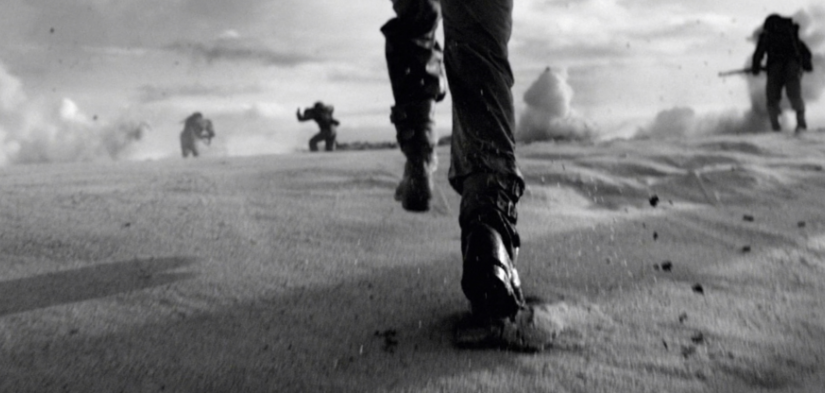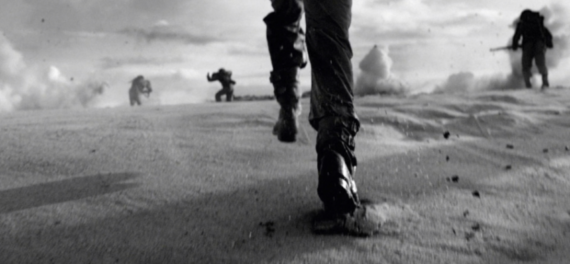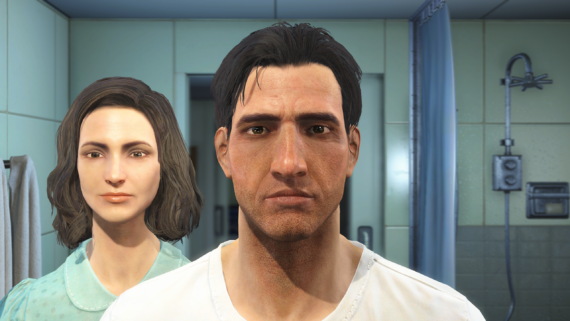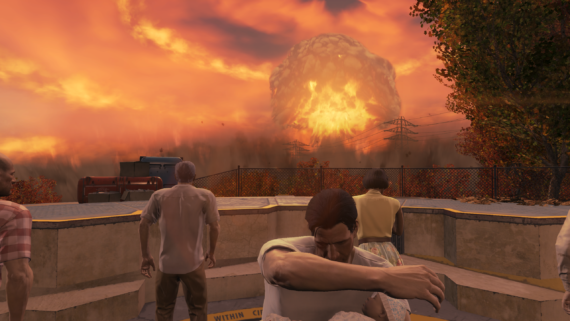A month or two after Fallout 4 launched I started my second character and something immediately bothered me: the male and female player characters have different backgrounds. This has been criticized for falling short of gender neutrality and for practical reasons – the character’s skills and knowledge – but my big issues are with the character’s emotional journey.
Why didn’t I find my journey as Nora the lawyer as engaging as Nate the soldier? The player character’s background as a veteran is integral to Fallout 4’s themes.
Note: For the record, I really liked Fallout 4. It has a great story and Bethesda Game Studios risked some bold changes, most of which paid off. This is just about narrative engagement, one of the inconsistent parts of the experience.
Warning: Many spoilers within.
A personal journey
All Fallout games are about building and running societies, but 4 has a much more personal edge that’s reflected in numerous choices ranging from the voiced protagonists to the lead piano in Inon Zur’s theme.
One of Fallout 4’s themes is “welcome home”, so much so that it’s the game’s tagline. It’s an ironic tagline, though, since the Sole Survivor should have no illusions that home will ever be the same. While the Vault Dweller, Chosen One, and Lone Wanderer all thought they could go home and have everything the way it was before the conflict – an ideal hero’s journey – the Sole Survivor’s old life is beyond recovery. There’s a physical place that was home, but a murdered spouse and crumbled world are inescapable. Even their son is unrecognizable.
Fallout’s previous protagonists have usually been given clear paths to get home again, but Fallout 4’s revelations about Shaun and the Institute set up a personal tension where the fate of the Commonwealth is pitted against the Sole Survivor’s desire to recover their family. The player can attempt to fulfill their circular journey, even trying to emulate pre-war life with Synth Shaun in a rebuilt Sanctuary Hills, or they can completely abandon the return to a “normal” life for a nomadic one. They must find their own way.

A lawyer’s journey
Nora’s given journey is not insignificant. A woman works hard to establish her career despite economic turmoil and global crisis. She is successful and can create a good life for her husband and infant son, away from the domestic troubles engulfing America. But, just as her new life is starting to gel, America’s far-away war strikes home and all her hard work is crumpled and blown away.
Engagement with Nora’s character is weakened because her career as a lawyer is largely irrelevant to her journey as the PC. The game’s issues around the rights of synths could be related to her legal experience, but that is not as essential as the themes of war and home. Her career feels more like a practical point to explain how they can afford a comfortable life, and perhaps an effort to turn her from a stock housewife into a more modern and progressive female character (she’s the breadwinner and a robot does the housework).
A soldier’s journey
This notion of losing home is much more powerful for Nate’s given backstory. A soldier is sent to a fierce conflict and manages to make it home relatively unscathed. There, he begins living the suburban American dream with his wife and new child, the thing all the Army recruiting posters promised. He made it! Then, in a few short minutes, the war arrives at his doorstep and his new life is taken away.
Nate was infantry, according to the USS Constitution’s lookout, and experienced enough to give him the jaded perspective of “war never changes.” He saw some depths of the human condition and now knows enough about war to say that it never changes. That is the seed of this narrative problem: The soldier saw war firsthand. The lawyer did not.

The furthest journey
The highs and lows of Nate’s physical and emotional journey are much more than what Nora went through. He left home in America for the intensity of war – duty, fear, victory, and death – made it back from Hell to his personal Eden, and then lost home again in the apocalypse. The soldier could not escape war.
Nora did not go through the same range of experience. Some may throw more emotional weight behind a mother-child bond than a father’s, but the game treats their relationship with Shaun as interchangeable; only their pre-war roles differ. Her challenges were school and career, not bombs and bullets, and she likely never had to leave America to do it. Nora’s experience losing her life in Sanctuary Hills is not nearly the same emotional intensity as Nate’s.
The most significant journey
This isn’t to say a civilian experiences war less intensely than a soldier does; their lack of experience would make the shock of attack more intense and difficult to process. Fallout 4 even gives the player character the best possible starting point of the series – life before the apocalypse – and thus is the furthest for them to fall when forced from home. What I find more profound and tragic about the veteran, and how 4 puts a twist on the Fallout player character archetype, is the cruelty of inescapable fate. It’s more than just the coincidence of cheating death twice; it’s about the mental journey of putting trauma behind only to have it ripped open again.
Making it home from war was a false victory when the war wasn’t actually over: Sanctuary Hills was a sanctuary from reality, a denial that the nation was crumbling, that the war existed, and that nukes loomed every day. A civilian would buy into the lie, even be an instrument of the lie, but a combat veteran must work harder to recover from their wartime experience and participate in the veneer of peace.

What could have been done differently?
Option 1, pre-production time machine
Completely interchangeable characters
Just have male and female player dialogue identical except for gendered pronouns and other appropriate words (“asshole” versus “bitch”, etc.). The player character is always the veteran, and their spouse is always the lawyer. This raises the question: is it appropriate to have a woman in a military combat role in the 1950’s-flavored culture of Fallout’s 2070’s United States?
The cultural stagnation that led to the persistence of the 1950’s suburban American Dream aesthetic is not as narrow as it first seems. There are pre-war terminals that describe women in leading roles (e.g. a REPCONN executive), female soldiers serve in Operation Anchorage, and Fallout 4 mentions a pre-war female draftee. Additionally, systemic racism must have been changed at some point: the wasteland is fairly ethnically diverse, and since virtually everyone is descended from Vault dwellers they must have been diverse going into those Vaults, something that wouldn’t have happened if certain ethnicities were still discriminated against.
However, one hinderance to immersion as a female character is that the intro video is narrated by Nate (voiced by Brian T. Delaney) before you have a chance to customize your character. Starting a new game plays out like this:
Instead, make two intro videos identical in every way except for the voice actor and wether a male or female soldier walks away from the camera at the end. Then, a new game would place the intro video after character customization when the proper video can be played:
The pre-war segment would become a teaser before the full introduction that builds tension by delaying the opening’s resolution. I’m undecided on wether I would cut to the video after the elevator drops into Vault 111 (high drama), or after the player is frozen below (reflective dream). I’m leaning toward the elevator, though – what a moment!
Option 2, mod it
Everyone’s War
The weird thing is that Nora-the-lawyer appears to have been a change some time into the game’s production. Unused voice files and dialogue branches exist where Nora (voiced by Courtenay Taylor) responds with mentions of military service, but these were replaced by alternates about her law career or her husband’s military service.
This provides a chance to rework dialogue trees to restore Nora’s past, and the opportunity to dive into the Creation Kit. Thus was born Everyone’s War, a very small mod (<100KB) that makes big changes to Nora.
There’s also another mod that includes re-edited audio for a more complete change.
Why did they change it? The backstory feels more consistent with Nate and Nora as completely different characters with distinct voices and backgrounds. I don’t feel that initial consistency is worth the emotional engagement it trades off for the rest of the game.
Option 3, rationalize
Just make something up
The run-up to 2077’s nuclear exchange was a 20-year period of crisis and war that would have resulted in numerous U.S. military actions. Nora could have been a military lawyer, or served combat duty prior to becoming a lawyer, but she identifies more as a lawyer than a veteran.
Practical Quibbles
I might as well mention these since they’re notable:
- A military background explains the ability to operate heavy and energy weapons. Civilian firearm ownership was clearly common in Fallout’s America of the 2070’s, but these were typical pistols, shotguns, and rifles. Energy weapons were rare outside the military, while heavy weapons – miniguns, missile launchers – require specialized skills to operate.
- Military training makes power armor use more plausible. Fallout games have been inconsistent with the need for power armor training, so I won’t nitpick that. However, the ability to maintain the armor takes skill, even for something seemingly mundane like swapping pieces.
The Commonwealth is literally littered with power armor and heavy weapons aren’t too hard to find, so I would expect to run into a lot more minigun-toting power-armored NPCs if they were easier to use and maintain. Instead, they are rare and for higher-ranked or unique NPCs outside of organizations like the Brotherhood and Atom Cats.







Like you, I found Nora’s apparent lack of military experience weakened her emotional journey a bit. But it turns out, Nora was in the military, too. Bethesda recorded dialog showing unequivocally she’s a veteran, they just never used it.
“I get it. You’re a hardass combat veteran. So am I. Can we move on?”
“He knew I was a veteran, so he let me on the ship.”
You can find these two lines if you look through the game’s audio files. (use a program called FO4VFRT; click on ‘playervoicefemale01’ in the left pane, then use the searchbox at the bottom to search for “veteran”.)
Presumably, she quit the service to go to law school. Or she’s a military lawyer.
I wish Bethesda had made that clear.
yes indeed! that’s why i made the mod:
https://flamingmac.com/everyones-war-fo4/
i think they just changed it, though, as the lawyer role came in until later into production. the original plan seems to be that the PC is always the soldier and spouse always the lawyer, so that’s what this mod restores.
Emilio the legend right! I loved it.